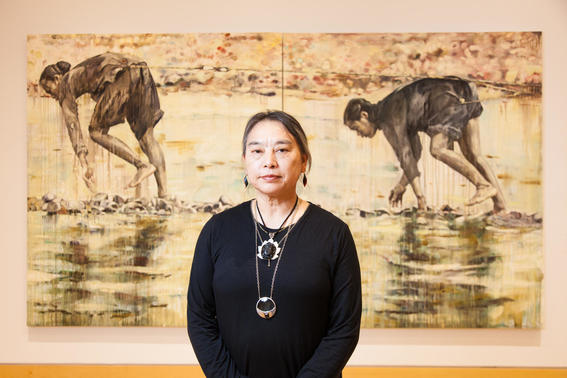
R
E
V N
E
X
T
Beijing’s UCCA Center for Contemporary Art has called off a solo exhibition of Chinese-American artist Hung Liu—originally slated to open December 6—after local officials denied authorization to import the artworks. As reported in The Art Newspaper, UCCA director Phillip Tinari clarified in a letter dated November 12 that despite having filed the requisite paperwork to the Beijing Municipal Bureau of Culture months prior, the Center was only informed less than two weeks ago of the rejection of the permit application.
Although the Bureau offered no explanation for its decision, Tinari suggested fractious Sino-US relations amid the ongoing trade war as a factor: “There has been a tightening of the civil sphere in China in recent months. There has also been an increase in tension between Hung’s native and adopted countries of China and the US. Topics that were once relatively open for discussion are now increasingly scrutinised.”
Born in Changchun, Jilin province, in 1948, Liu emigrated to the US in 1984. Chinese workers, soldiers, and women are recurring subjects of her paintings, which draw on historical photographs in addition to her experiences of laboring in the countryside as part of her “re-education” during the Cultural Revolution. The artist surmised that the Bureau’s decision may have been motivated by reasons beyond the trade war, telling The Art Newspaper: “My work has always been about human struggle in epic times . . . perhaps because of who I am, there is too much history in my work.”
In an interview with The New York Times, Liu explained that the Bureau denied the permit even after she agreed to withdraw nine pieces that had initially raised red flags with officials. Among the censored works is a 2011 painting of 12 schoolgirls in gas masks, inspired by a photograph of an air-raid drill during the Second World War. Liu remarked that her Chinese artist friends believe the painting failed to pass censors due to its potential association with the ongoing anti-government protests in Hong Kong, where protestors—many of them students—wear gasmasks as protection against police-fired teargas.
China’s notoriously opaque censorship and customs procedures are a perennial challenge for artists and cultural institutions. The recent launch of the widely anticipated Centre Pompidou x West Bund Museum in Shanghai was accompanied by concerns over the censorship of “fewer than five works,” according to Pompidou president Serge Lasvignes, from the inaugural exhibition “The Shape of Time” (2019–21). In June 2018, Chinese authorities banned the display of Ken and Julia Yonetani’s Crystal Palace (2013) uranium-glass chandelier at Shanghai’s Powerlong Art Museum. Mizuma Sueo of Mizuma Art Gallery, which represents the duo, believed the sculpture was barred “because it critiques the Chinese government’s nuclear power generation policies.”
The UCCA has yet to reveal plans for future programming in lieu of the cancelled show.
Ophelia Lai is ArtAsiaPacific’s associate editor.
To read more of ArtAsiaPacific’s articles, visit our Digital Library.












